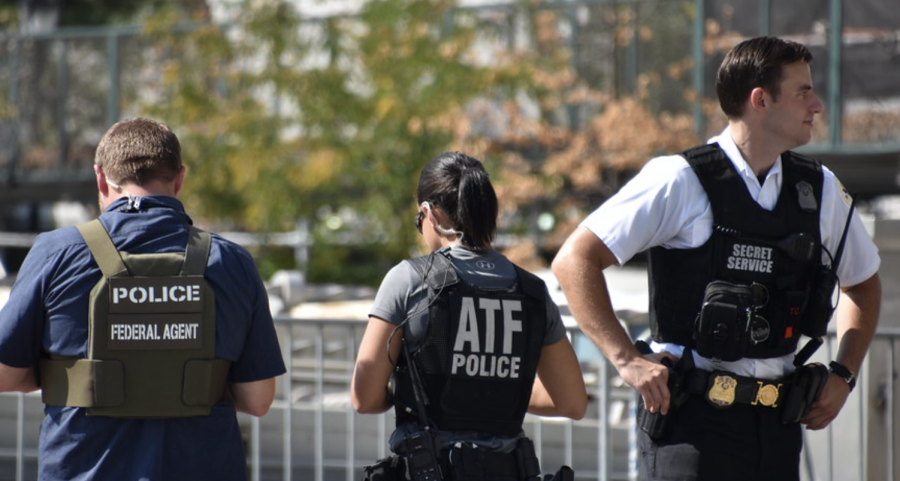Constitution and ATF are mutually exclusive
New rule could mean millions of American will face prosecution, fines, and arrest at the hands of an out of control gov. agency
February 9, 2023
The Bureau of Alcohol, Tobacco, Firearms, and Explosives (ATF), which in recent years has narrowed its focus primarily to firearms enforcement, has, on a whim, decided to reinterpret decades-old legislation and threaten millions of Americans with felonies. While it may seem like a small technicality at first, this is a massive overreach of power in our Constitutional democracy. The ATF is an enforcement agency, and therefore has no constitutional power to simply reinterpret laws established by acts of Congress and upheld by the courts.
For some background, this new rule bans the use of bracing devices on pistols, commonly referred to as pistol braces or arm braces, without first registering the firearm with the ATF and paying a prohibitive tax. This rule comes out of a novel interpretation of the 1934 National Firearms Act, which placed restrictions on the ownership of various firearms, particularly for this case, short barreled rifles (which are rifles with a barrel length of less than 16 inches that can be fired from the shoulder). Pistols and handguns, since they are not designed to be used with a shoulder stock, fall under different legislation.
When pistol braces came onto the scene in 2012, they were intended to allow people with various physical disabilities to better control their legally owned pistols by allowing the pistol to be fastened to their wrist or forearm for better stabilization. As with any new firearms technology, the products went through an approval process with the ATF to ensure they would not violate any existing legislation. After review, pistol braces did indeed receive approval to be sold without any additional registration, as they are an accessory to the firearm and do not alter the mechanical function of the firearm in any way.
However, at the end of 2022, the ATF rescinded its approval of pistol braces, and declared that installing a pistol brace turns the firearm into a short barreled rifle, and is thus subject to NFA restrictions. They argue that these pistol braces can be used as an alternative to a shoulder stock, making the pistol capable of being fired like a rifle. All NFA items must be registered with the ATF and their owners must pay a tax for each subjected item per the 1934 legislation. The rule gives pistol brace owners 120 days to comply with the taxation and registration of their previously legally owned items, turn in the items for destruction, or face substantial federal penalties. These penalties for owning a plastic accessory, by the way, are the same penalties one would face if they owned an unregistered machine gun, which include a fine of up to a quarter of a million dollars and up to ten years in federal prison.
While more hard-line Second Amendment activists than myself may disagree, I do not see this interpretation of pistol braces as a potentially NFA item to be a particularly egregious infringement on our 2A rights. From their design, it is clear that pistol braces were intended to be used in ways other than their marketed purpose, and are essentially shoulder stocks for handguns. My problem with the ATF’s new rule is how they went about reinterpreting existing legislation and enforcing it without any constitutional checks on their decision.
The bureau had the opportunity to declare pistol braces prohibited items back in 2012 when they first came onto the market, which is fully within the scope of their jurisdiction. However, they gave pistol braces the all clear, and allowed several million of them to be sold over the last decade. The ATF does not, however, have the power to simply change their minds and threaten legal action against those who, for the past decade, have legally owned a piece of plastic bolted to the backs of their handguns. This new interpretation of the law gives millions of pistol brace owners two options, to either essentially pay extortion money to the government in the form of an NFA tax, or face federal prison. Either way, the ATF has potentially jeopardized the rights of millions of Americans without any congressional or judicial oversight.
The ATF has stepped out of its constitutional bounds in reinterpreting a prior ruling, a process which is traditionally left to the courts, or to the legislature if they desire to amend prior legislation. In the process, the ATF is now subjecting Americans to an ex post facto law, which criminalizes the ownership of items which were legally owned and possessed until this new ruling.
If pistol braces truly posed some threat to public or consumer safety or to national security, then the ATF has failed in its duty to enforce firearms legislation for the past decade. Since there are no instances of pistol braces killing or injuring anybody (since again they are an accessory, not a firearm in and of themselves) I would argue that there is no reason for the ATF to attempt to correct their mistake, in essence no harm no foul. If there were truly an issue which has only recently come to light with these braces, it would be up to Congress or individual state legislatures to amend or pass legislation to particularly reference these devices. In short, this new ruling both shows how ineffective the government is at real world problem solving and proves that the ATF is in clear violation of our cherished constitutional democratic process.




Yahya Shakir • Jun 18, 2023 at 8:23 am
Agreed!